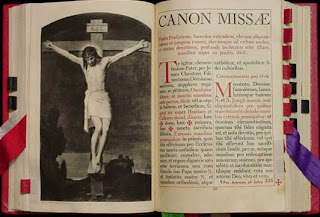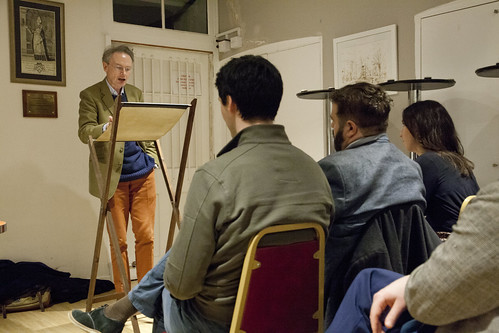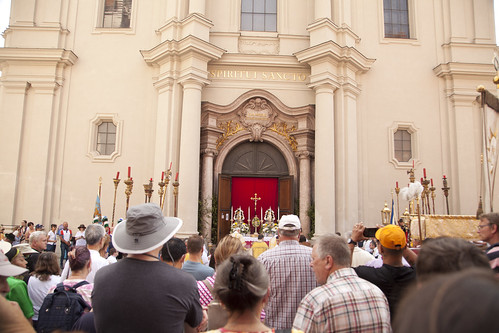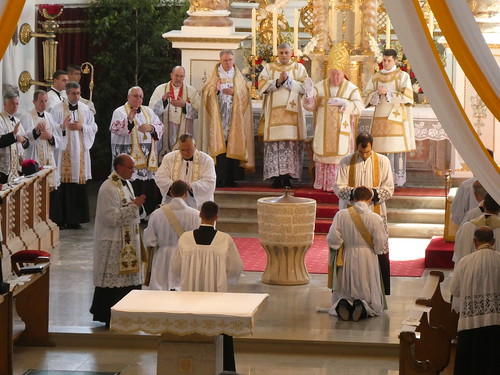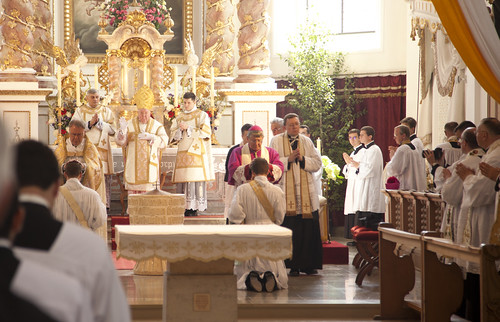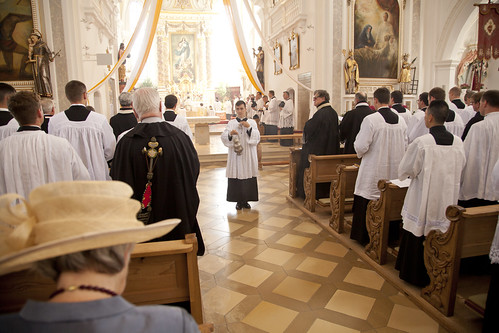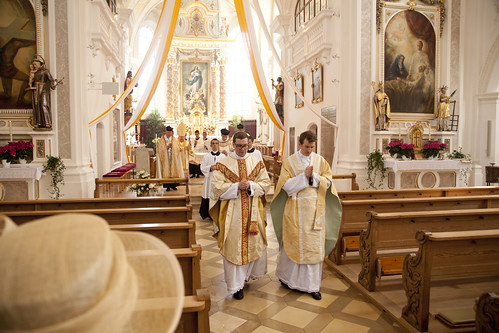Chairman's Blog
New podcasts: interview with Timothy Stanley
Tim writes in the Telegraph and is on Twitter as @timothy_stanley
Learn Latin this Summer! Residential and Online options
 |
| Mass at Park Place during the Guild of St Clare Sewing Retreat in the spring. |
Residential Latin Course, 8th - 13th August
Online Courses, July–October
What does Pope Francis mean in Desiderio desideravi?
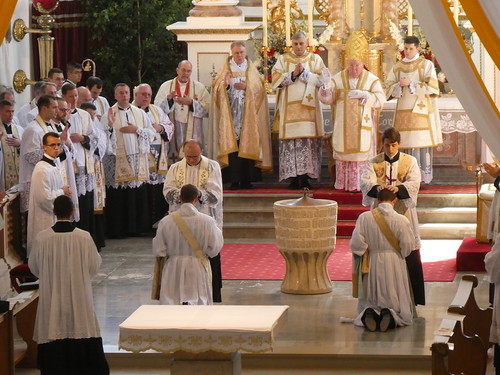 |
| The laying-on of hands at the recent priestly ordination in Bavaria for the Fraternity of St Peter. |
My latest on 1Peter5.
Desiderio desideravi: “with desire have I desired,” Our Lord said to His Disciples before the Last Supper, “to eat this Pasch with you.” The quaint Latin phrase is a literal translation of the Greek of the Gospels (Luke 22:15; Matthew 13:14), but it is no less quaint in Greek. It is in fact an expression at home in Hebrew, which does this kind of thing to express a superlative. No doubt this was an expression in use in Our Lord’s native Aramaic as well. The fidelity of a succession of translators has brought it to us today as something at once mysterious, poetic, intriguing, and rather beautiful. The effort necessary to understand it, its very elusiveness, has the effect of fixing it in our minds, and making it echo in our souls. To put it another way, the slight barrier to propositional understanding increases its transformative potential for us.
Every poet, every novelist, knows this. It is a mystery hidden, however, from modern Biblical translators, who come up with phrases like the one used in the English version of Pope Francis’ Apostolic Letter of this name: ‘I have earnestly desired.’ It is flat, utilitarian, and drab; defensible as a translation, to be sure, on modern principles, but about as memorable as a corporate mission statement.
Which is to be master, one may ask? The Church’s Tradition, which draws us in through mystery, or the flattened-out, dreary rationalism of liturgical Modernism? It is a problem with which Pope Francis struggles in this Letter. He sees the struggle in terms of avoiding two bad options, which present themselves as opposites.
I want the beauty of the Christian celebration and its necessary consequences for the life of the Church not to be spoiled by a superficial and foreshortened understanding of its value or, worse yet, by its being exploited in service of some ideological vision, no matter what the hue (16).
The Myth of Liberal Neutrality
Beleaguered liberal academics often appeal to the idea that universities should be neutral on substantive issues: they should teach the scientific or philosophical method, or the method of literary criticism, or whatever, but not enforce a single view of the correct answers. This kind of argument is also used in relation to schools, and in general to all the activities of the state. It is not just a bad argument, but a strategically disastrous one.
Classical liberals claim that what they want is simply a framework within which free enquiry can take place. The only limit to the debate which a classical liberal can accept is the defence of free enquiry itself. The only voices which are excluded are those which would silence other voices. But — they say — this is not a real limitation, a limit on what substantive results are allowable, because it is merely the limit imposed by rationality itself. Those who would silence other voices are rejecting rationality, in rejecting the value of the free debate which those voices would stimulate.
Iota Unum Podcasts: Prof Thomas Pink
Traditional Catholics in the Synod on Synodality
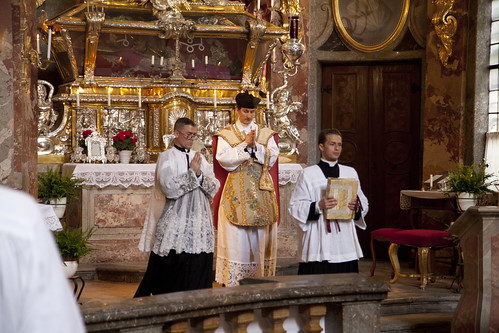 |
| A newly ordained priest, of the Fraternity of St Peter, concluding his first, Traditional, Mass in Munich. Fr Gwilym Evans comes from Wales. |
(viii) Traditionalists 72. Although very few in number, a sense of grievance and marginalization is strongly expressed by those who worship using the Missal of 1962. Traditionalists complain of “sadness and anger” at the restrictions they believe were imposed by Pope Francis’s Traditionis Custodes, which restored to bishops the regulation of the provision of pre Second Vatican Council liturgies. 89 Adherents of the Traditional Latin Mass (TLM) complain of the “watering down” of liturgical devotion in eucharistic celebrations following the Council, and fear that the Church has capitulated to “modernistic” ideas. 90 In response to questions about marginalisation and exclusion, both TLM adherents and those committed to “maintaining traditional Catholic teaching against what they interpret as harmful modifications” feel “badly treated by the bishops and by Pope Francis“ and “saddened by a sense that their views are habitually denigrated and their voices left unheard and unanswered.”91
A sense of marginalisation and pain included those who value the traditional Latin Mass: ‘Seeing how fundamentally these Masses have affected our own journey in faith, and how profoundly they are drawing souls to the church, including many young families, we are concerned that a baseline policy going forward will be to make provision of the Latin Mass a serious and real priority in our Archdiocese and beyond; something which appears to be under threat at present, and a cause for alarm even in the secular world, making headline news. [Individual submission]. Birmingham Archdiocese
There were, from several reports, an appeal for a return to and encouragement of traditional Catholic pious practices. Some referred to traditional Corpus Christi processions as a means of witness. A few reports highlighted the desire to be inclusive of those who prefer the ‘Extraordinary Form’ (elsewhere: ‘Tridentine Rite’), though one report indicated that where the Extraordinary Form had been experienced as ‘imposed,’ ‘division and hurt’ had occurred. Many reports indicate a hunger among the people for wider prayer and spiritual formation opportunities, as the world, and Church, emerge from the pandemic. Cardiff Archdiocese
Another said that “Modern liturgy is tedious, dull, impoverished, casual and uninspiring.”. The loss of the opportunity to participate in the Tridentine Rite was expressed both by those who want it and those who feel sympathy for a group they believe has now been excluded. Clifton Diocese
An appreciation of the variety of styles of liturgy was expressed. Some responses called for more ‘lively and engaging’ liturgies, whilst others expressed the need for ‘reverence’ and ‘silence’. Liturgies expressing the diversity of the cultures making up our parish communities was seen as desirable by around 20%. Portsmouth Diocese
There are binary views about how we celebrate Mass and the Sacraments which present challenges to synodality. A minority perceive a decrease in “devotion characterised by reverence and awe” and would like greater access to the Latin Mass; they are deeply hurt and angered by Traditionis Custodes. Others feel the Mass is too traditional and ‘stuffy’ and lacks joy. Plymouth Diocese
There were several calls for the wider use of the 1962 Missal and availability of the Latin Mass, one request being typical of others: “I would be grateful if there was a Latin Mass near me. At present I have to drive a long way to attend one” (240). Another wrote: “It’s strange to hear all this talk about inclusivity. The Latin Mass is being reigned in, the liberals aren’t” Shrewsbury Diocese
Those who describe themselves as traditionalists who desire to worship in the Extraordinary Form feel marginalised by the Church hierarchy (as if not tolerated by Rome) and even some of the clergy in the diocese. Some feel that the Holy Father is moving to eliminate the traditional rite of Mass and this leaves them feeling profoundly alienated. Lancaster Diocese
Fr Gwilym Evans FSSP: First Mass, photos
FSSP Ordinations in Bavaria: photos
 |
| Photo by Monika Rheinschmitt |
Latin and NT Greek intensive week with the LMS
 |
| Mass at Park Place at the Sewing Retreat |
Booking is open for our intensive study week of either liturgical Latin or New Testament Greek, 8th August - Saturday 13th August 2022.
The venue is Park Place Pastoral Centre, a Catholic retreat centre in Hampshire (Wickham, Fareham, Hampshire PO17 5HA).
- Find your own level with our experienced Latin tutors: Fr John Hunwicke and Ethan Freeman will be dividing students into beginners and the more advanced.
- Matthew Spencer will be teaching the New Testament Greek, as he has been doing online.
- A relaxed and Catholic atmosphere focusing on the liturgical and scriptural uses of the languages.
- A comfortable setting, with en suite single and twin rooms, and rather good food -- which we've experienced before in the Guild of St Clare Sewing Retreat.
- There are huge discounts for clergy and seminarians for the Latin.
The Teaching of the Church on Fashion: review
Christian Fashion in the Teaching of the Church, by Virginia Coda Nunziante (Calx Mariae
Publishing, 2022) pp108.
This book is being launched in London, in the St Wilfrid Hall of the London Oratory, on Thursday 9th June, and I have been asked by the publishers, Calx Mariae Publications, to review it in advance of this event. please click here for more details.
This short book comprises the author’s own introduction to the subject, and materials drawn from the speeches and writing of Popes Benedict XV, Pius XI, and Pius XII, with two final contributions from Cardinals Siri and Colombo. The documents date from 1914 to 1971. They end at this point because the Popes after Pius XII do not seem to have addressed the issue. Although small, therefore, this collection is comprehensive, at least in terms of the modern era, and for this reason extremely helpful to anyone interested in the subject.
The enormous scope of the subject make the task of the Introduction difficult, and this difficulty is compounded by the reluctance of the Popes to specify exactly what they are talking about among the fashions of their own times. The earlier part of the period covered by these documents saw the development of recreational bathing, female sports and engagement in the work-place (particularly during the world wars), as well as many style trends. There are some references to the changing role of women and new realities such as dressing for the beach, but none at all to things like the length of skirts, sleeves, swimwear, or women wearing trousers, although Cardinal Siri does attend to this last issue.
It is very difficult to say anything about the history of fashion in a short space without fear of contradiction. For example, the Introduction contrasts a period of ‘customary’ clothing before the advent of modern ‘fashion’, and there was certainly a change of tempo in the world of clothes with the advent of mass production and modern communications, but it is important to keep even this in perspective. 19th century Parisian fashions were transported across Europe and America for sale and imitation year by year, and even the clothes of the poorer majority are strikingly different century by century. On the other hand, the classic English suit, which is now found on formal occasions in every corner of the globe, has changed remarkably little since its development about 170 years ago.
Similarly, generalisations about how covered-up women were in former times need to be hedged about with qualifications. The depiction of ‘Summer’ in the Très Riches Heures du Duc de Berry, a richly decorated manuscript from early 15thcentury France, juxtaposes elegantly-dressed nobles hawking on horseback with other people bathing in a river, stark naked. Again, there is a sharp contrast between day-wear and evening-wear in 19th century clothes: Victorian evening gowns were much more revealing than what the same people would have worn in the working day, and these were themselves a reaction against the still-less modest fashions of the previous era.
There has never been a time when there was not a lively debate about clothing: as Pope Pius XII remarks, in this volume, with the Preacher, there is nothing new under the sun (Eccles. 1:9). The focus of this debate has changed, however, and has done so in confusing ways. It is useful to keep in mind three Latin terms: luxuria, modestia, and pudor. Luxuria means lust, but in modern English of course ‘luxury’ means something quite different, referring to high-status or extravagant items or lifestyle. The meaning of modestia has travelled in the opposite direction: in Latin it refers to the virtue which avoids extravagance, notably in clothing, but now, when applied to clothes, it is allied to chastity. Pudicia is commonly translated ‘modesty’, which is fair enough but can add to the confusion. It refers to a sense of shame, which is connected with social norms.
In the history of the debate over the centuries there has been a marked shift of emphasis from modesty in the old sense to modesty in the new sense. A great deal is said by the Doctors of the Church about avoiding excessive display, which is a sign of pride; the competition to wear the finest clothes could even lead to financial ruin in centuries past. Excessive extravagance still gets a mention by the modern Popes in this collection, but it is clearly much less of a problem, by their time, than clothing that is destructive of purity. I would say that, since the era of these documents, a striking new issue has arisen: of clothing associated with a nihilistic ideology of ugliness: ripped and dirty clothes, and clothes deliberately at odds with their original use, or with each other.
Fashion is a subject which requires historical perspective and careful distinctions. The most valuable contribution to the teaching of the Church in this collection is accordingly the longest and most nuanced, the address of Pius XII to an association of people involved in fashion in 1957. He makes a number of very valuable points.
First, the Church does not deprecate fashion in itself. ‘This penchant for the adornment of one’s person clearly derives from nature, and is therefore legitimate.’ Like other forms of art, fashion develops by its own authentic principles: ‘it is quite true that fashion is like art, science, politics, and other so-called profane activities, which follow their own rules to attain the immediate ends for which they are intended.’ Fashion makes an important contribution to social development: ‘It might be said that society speaks through the clothing it wears.’
On the other hand, Pope Pius XII condemns a form of what Martin Mosebach calls ‘the heresy of formlessness’:
the insistent attempts of many contemporaries to separate the exterior activities of man from the moral realm as if the two belonged to different universes, as if man himself were neither the subject nor the object of the moral realm, nor therefore responsible before the Sovereign Regulator of all things.
It is precisely because clothes are important, and have a contribution to make to the cultural development of a nation, that we cannot be passive participants in its trends. Bad trends should be resisted. Just because a particular kind of immodest garment has become widely accepted, that does not make it permissible. The promotion of such garments may even, on occasion, be the result of a malicious intention among some designers.
What, however, does this mean in practice?
We do not intend to suggest that the expansive force or the creative genius of designers should be repressed, nor that fashion should be reduced to unchanging forms, to monotony or to dismal severity. On the contrary, We mean to indicate the right road that styles should follow, so that they may achieve their end as faithful interpreters of civilised and Christian traditions.
Avoiding the errors of ignoring the problem, of accepting fashions blindly, and of a lack of moderation, Pope Pius XII appeals to the instincts of the individual: ‘the sense of shame, almost without being consulted on the matter, gives immediate warning as to where immodesty and seduction, idolatry of matter and luxury (or simple frivolity) might be lurking.’
He also appeals to the designers themselves: who of course were present in his original audience.
 |
| Raphael's La Donna Velata |
Far from wanting a return to outdated forms (which not uncommonly reappear as novelties in fashion) but wanting rather to confirm the perennial value of sobriety, We should like to invite today’s artists to dwell for a moment on certain feminine figures in the masterpieces of classical art which have undisputed aesthetic value, and where dress, marked7by Christian decency, is the worthy ornament of the person with whose beauty it blends as in a single triumph of admirable dignity.
These are beautiful words and admirable aspirations, but I know that some readers will be frustrated by the lack of specificity. They will ask, What does ‘sobriety’, ‘dignity’ and so on mean in practice? Can I wear my ripped jeans to the shops? Can I even go to the beach, let alone dress as is expected there?
The reason for this vagueness is that by definition fashion is variable, and applies to varied circumstances. What is appropriate for a car-repair workshop is not necessarily appropriate for going to church. Geography, cultural heritage, age, sex, class, all affect what is appropriate or indeed possible. What Pope Pius says is unfortunately correct: we must develop our ability to discriminate between what is practical, becoming, and appropriate, and what is not. Some of the Popes, and Cardinal Siri, called for an education of society through the efforts of organised Catholic groups, but we can’t wait for this to happen. To get through the current crisis, we will all have to think for ourselves.
I do not think this is as unhelpful as it may sound, because a large part of the problem is precisely people not thinking. Thoughtlessness is the major barrier to a healthier relationship with our clothes. Stop just wearing the easiest thing, or the thing others are wearing. Within your means, think about what will make you look nice: something becoming and dignified. For many people this thinking may be immature at first, but it would be a big step in the right direction.
And what did Cardinal Siri say about women in trousers, you ask? To find out that, I suggest you buy the book.


